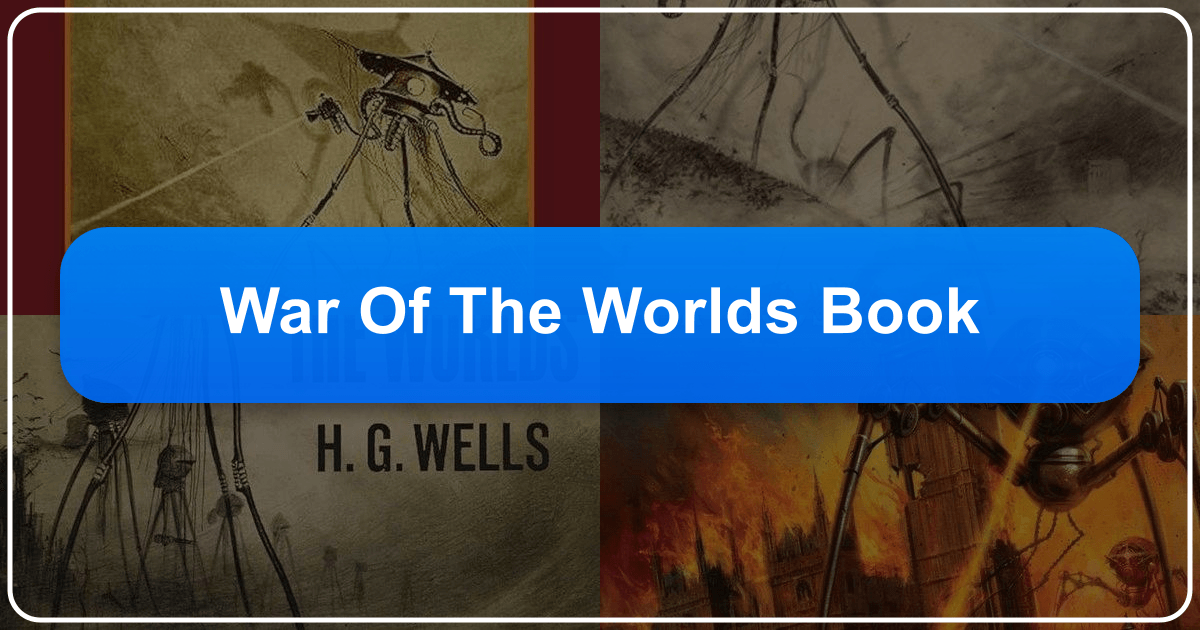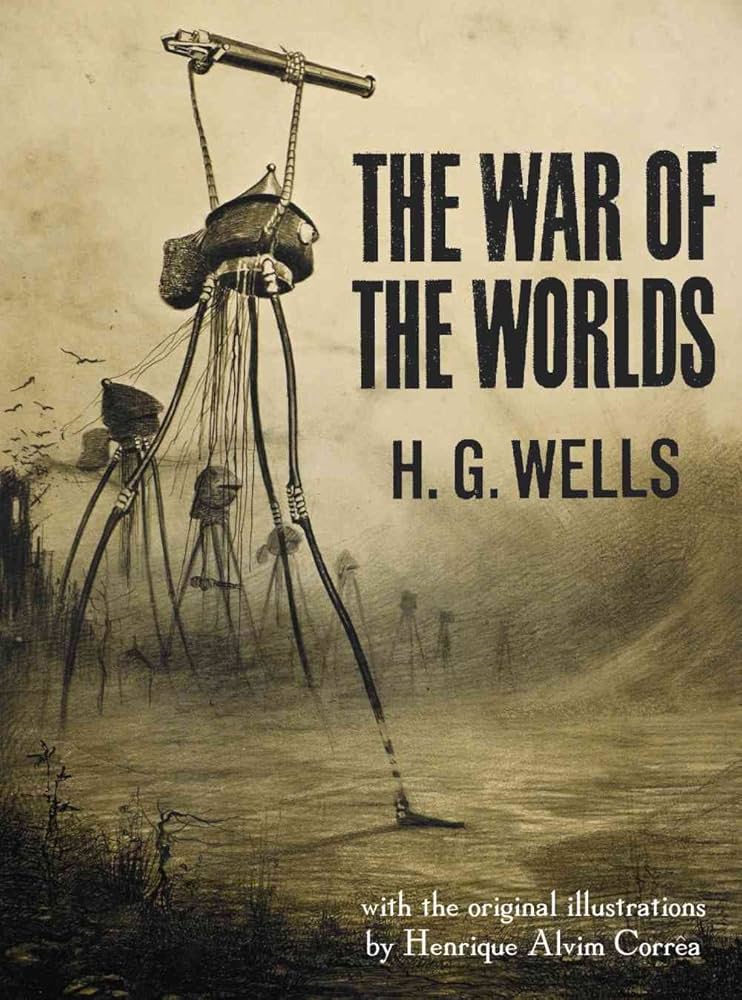The War of the Worlds Book: A Comprehensive Exploration

H.G. Wells’ The War of the Worlds stands as a cornerstone of science fiction, captivating readers for over a century with its chilling portrayal of a Martian invasion of Victorian England. This exploration delves into the novel’s enduring appeal, examining its various facets through the lenses of literary analysis, cultural impact, and its ongoing relevance.
Genre, Classics, and Enduring Appeal
The War of the Worlds, while firmly rooted in the science fiction genre, transcends simple categorization. Published in 1898, it predates the formal establishment of science fiction as a distinct literary genre, yet it embodies many of its core elements: advanced technology, extraterrestrial life, and a confrontation between humanity and a superior force. However, the novel’s exploration of themes such as imperialism, social commentary, and the fragility of civilization elevates it beyond a mere adventure story. Its inclusion in countless “Classics” lists underscores its lasting literary merit and its continued resonance with readers across generations. The novel’s enduring popularity isn’t solely based on its imaginative premise; it lies in Wells’ masterful storytelling, the intricate development of the narrative tension, and the psychological depth of the protagonist’s experience. The book’s stark realism in portraying human fear, desperation, and resilience amidst unimaginable circumstances is a significant factor in its lasting power.

Bestsellers and New Releases
While the original 1898 edition isn’t available as a new release, The War of the Worlds consistently ranks as a bestseller in various formats. Numerous editions, translations, and adaptations ensure its continued presence in bookshops and digital libraries. This enduring popularity speaks to the timeless nature of the themes Wells explores, themes which remain profoundly relevant in contemporary society. The book’s popularity continues to generate new releases through adaptations in other media (see section on Cultural Impact below). Further, new editions frequently appear, often incorporating updated artwork or scholarly introductions that provide fresh perspectives on the text.

Book Reviews: A Century of Critical Acclaim
The critical reception of The War of the Worlds has been overwhelmingly positive, reflecting its significant literary contribution. Reviews from the time of its initial publication praised the book’s vivid descriptions, narrative drive, and the unsettling sense of realism it imparted to the science fiction concept. Modern reviews continue to highlight these strengths and also engage with the novel’s complex themes of imperialism, scientific progress, and human nature. The breadth of interpretation showcases the novel’s versatility, capable of providing insightful commentary to readers across diverse backgrounds and time periods. Negative reviews have occasionally pointed out some of the narrative limitations, the limited development of some secondary characters, or the sometimes dated societal context, but these criticisms rarely detract from the book’s overall impact. The vast majority of reviews celebrate its continued relevance and significance.
H.G. Wells: Author and Visionary
H.G. Wells, the author of The War of the Worlds, was a prolific writer whose work encompassed various genres, from science fiction to social commentary. His sharp intellect and deep understanding of social dynamics influenced his writing style, creating narratives that are not only gripping and imaginative but also offer insightful observations about the human condition.

Writing Style and Inspirations
Wells’ writing style in The War of the Worlds is notable for its journalistic approach, presenting the story as a first-person account of a seemingly ordinary individual caught up in extraordinary circumstances. This immersive style directly engages the reader, enhancing the sense of immediacy and realism. The narrative unfolds gradually, building tension through carefully chosen details and the protagonist’s evolving emotional state, leaving the reader on the edge of their seat. Wells’ literary inspirations are diverse, ranging from classic literature to contemporary scientific advancements. His background in science likely informed his scientifically plausible (for the time) depiction of the Martian invasion, while his astute observation of social dynamics contributes significantly to the realism of the human characters’ reactions and behavior in the face of extraordinary challenges. His understanding of the potential destructive capacity of emerging technologies and the inherent flaws of human nature is evident throughout the novel.
Famous Works and Literary Influence
Wells’ prolific output includes other seminal science fiction works like The Time Machine and The Invisible Man, along with numerous social and political essays. These works, taken together, showcase his distinctive blend of scientific insight and social commentary. The novel’s impact on the development of the science fiction genre is undeniable, influencing countless authors who followed. His ability to explore the societal impact of scientific advancements and the conflict between human civilization and powerful forces (both natural and technological) remains a key theme.
Reading and Learning from The War of the Worlds
The War of the Worlds offers far more than thrilling escapism; it provides valuable insights into human nature, societal dynamics, and the ever-present possibility of unforeseen catastrophes.
Summaries and Educational Value
The novel’s plot centers on an alien invasion of England, told through the eyes of a nameless narrator. The story unfolds as a series of increasingly harrowing events, culminating in the invaders’ unexpected demise. The educational value extends far beyond the narrative itself. The War of the Worlds serves as a compelling study of social behavior under duress, the limitations of human ingenuity in the face of overwhelmingly powerful forces, and the capacity for both resilience and despair in times of crisis. It serves as a starting point for discussions on science, sociology, and political theory.
Life Lessons and Reading Habits
The novel explores the universal themes of fear, loss, survival, and the limitations of humanity. The protagonist’s experience mirrors the reader’s own sense of helplessness in the face of an overwhelming external force. Reading The War of the Worlds encourages critical thinking about the fragility of civilization, the importance of preparedness, and the need to consider the wider context of events. The book’s narrative structure itself can be a study in effective suspense-building and immersive storytelling, inspiring readers to examine similar methods in literature. The contrast between the seemingly ordinary setting and the extraordinary events underscores the ease with which established norms can be disrupted. The ending, in its unexpected twist, reminds readers that even the most formidable threats can succumb to unforeseen factors, even as it underscores the relentless march of time and the ever-present shadow of potential disaster.
Libraries and Archives: Preserving a Literary Legacy
The War of the Worlds is readily accessible in various libraries, both physical and digital. Project Gutenberg, for instance, offers a free electronic version, ensuring the novel’s continued availability to readers worldwide. University archives and special collections likely hold rare editions or related manuscripts and correspondence. The novel is an important part of any science fiction library and many public libraries’ collections. The ease of access allows for ongoing study and appreciation of the novel.
Cultural Impact: Adaptations and Enduring Influence
The War of the Worlds has had a profound and multifaceted impact on popular culture.
Literary Influence and Adaptations
The novel’s influence on subsequent science fiction is extensive, shaping the tropes and themes of the genre for decades. The story itself has been adapted into numerous films, radio dramas, television series, and even musical productions. Orson Welles’ infamous 1938 radio broadcast is legendary for the widespread panic it caused, demonstrating the novel’s enduring power to stimulate the imagination. These adaptations contribute to its enduring appeal, reaching diverse audiences and offering different interpretations of Wells’ original work. The continued popularity of the story in various media forms suggests its enduring thematic relevance and the capacity for ongoing reinterpretation.
Awards and Communities
While the book predates many major literary awards, its impact on the genre and popular culture has been widely acknowledged. Fan communities dedicated to The War of the Worlds actively engage with the novel, discussing its themes, analyzing its narrative structure, and exploring its cultural legacy. The existence of these communities is a testament to the work’s enduring appeal and the richness of its themes. These communities often engage in speculative discussions, comparing the novel’s predictions to contemporary events and considering the lasting impact of its narrative structure on science fiction.
This multifaceted exploration reveals The War of the Worlds not as a mere science fiction novel but as a timeless work of literature with enduring cultural significance, continuing to stimulate the imagination and provide insightful commentary on the human condition. Its accessibility across diverse media and its consistent presence as a bestseller showcase its lasting impact on readers and popular culture.